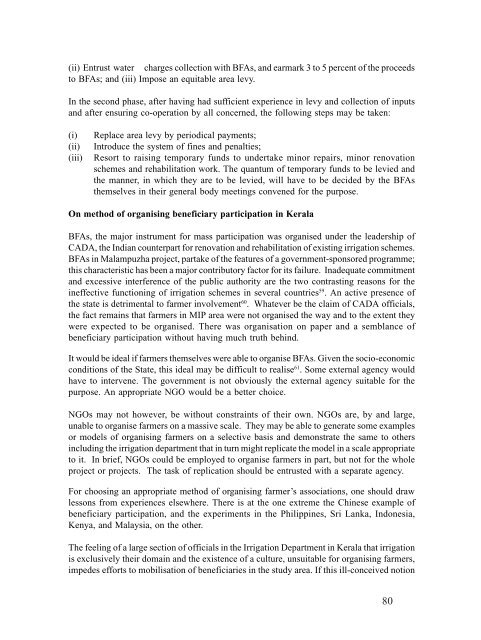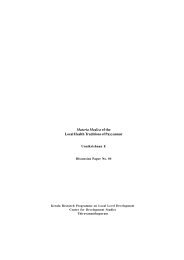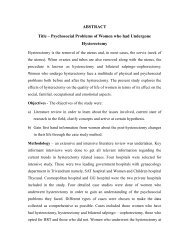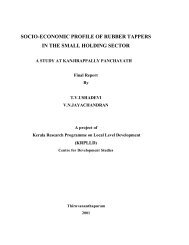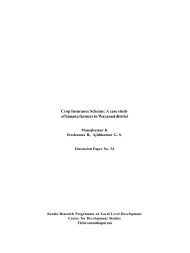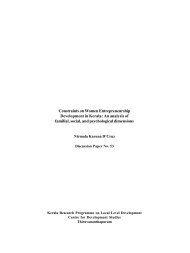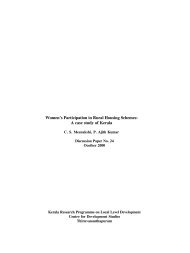Beneficiary Participation in Irrigation Water Management: The Kerala
Beneficiary Participation in Irrigation Water Management: The Kerala
Beneficiary Participation in Irrigation Water Management: The Kerala
You also want an ePaper? Increase the reach of your titles
YUMPU automatically turns print PDFs into web optimized ePapers that Google loves.
(ii) Entrust water charges collection with BFAs, and earmark 3 to 5 percent of the proceeds<br />
to BFAs; and (iii) Impose an equitable area levy.<br />
In the second phase, after hav<strong>in</strong>g had sufficient experience <strong>in</strong> levy and collection of <strong>in</strong>puts<br />
and after ensur<strong>in</strong>g co-operation by all concerned, the follow<strong>in</strong>g steps may be taken:<br />
(i) Replace area levy by periodical payments;<br />
(ii) Introduce the system of f<strong>in</strong>es and penalties;<br />
(iii) Resort to rais<strong>in</strong>g temporary funds to undertake m<strong>in</strong>or repairs, m<strong>in</strong>or renovation<br />
schemes and rehabilitation work. <strong>The</strong> quantum of temporary funds to be levied and<br />
the manner, <strong>in</strong> which they are to be levied, will have to be decided by the BFAs<br />
themselves <strong>in</strong> their general body meet<strong>in</strong>gs convened for the purpose.<br />
On method of organis<strong>in</strong>g beneficiary participation <strong>in</strong> <strong>Kerala</strong><br />
BFAs, the major <strong>in</strong>strument for mass participation was organised under the leadership of<br />
CADA, the Indian counterpart for renovation and rehabilitation of exist<strong>in</strong>g irrigation schemes.<br />
BFAs <strong>in</strong> Malampuzha project, partake of the features of a government-sponsored programme;<br />
this characteristic has been a major contributory factor for its failure. Inadequate commitment<br />
and excessive <strong>in</strong>terference of the public authority are the two contrast<strong>in</strong>g reasons for the<br />
<strong>in</strong>effective function<strong>in</strong>g of irrigation schemes <strong>in</strong> several countries 59 . An active presence of<br />
the state is detrimental to farmer <strong>in</strong>volvement 60 . Whatever be the claim of CADA officials,<br />
the fact rema<strong>in</strong>s that farmers <strong>in</strong> MIP area were not organised the way and to the extent they<br />
were expected to be organised. <strong>The</strong>re was organisation on paper and a semblance of<br />
beneficiary participation without hav<strong>in</strong>g much truth beh<strong>in</strong>d.<br />
It would be ideal if farmers themselves were able to organise BFAs. Given the socio-economic<br />
conditions of the State, this ideal may be difficult to realise 61 . Some external agency would<br />
have to <strong>in</strong>tervene. <strong>The</strong> government is not obviously the external agency suitable for the<br />
purpose. An appropriate NGO would be a better choice.<br />
NGOs may not however, be without constra<strong>in</strong>ts of their own. NGOs are, by and large,<br />
unable to organise farmers on a massive scale. <strong>The</strong>y may be able to generate some examples<br />
or models of organis<strong>in</strong>g farmers on a selective basis and demonstrate the same to others<br />
<strong>in</strong>clud<strong>in</strong>g the irrigation department that <strong>in</strong> turn might replicate the model <strong>in</strong> a scale appropriate<br />
to it. In brief, NGOs could be employed to organise farmers <strong>in</strong> part, but not for the whole<br />
project or projects. <strong>The</strong> task of replication should be entrusted with a separate agency.<br />
For choos<strong>in</strong>g an appropriate method of organis<strong>in</strong>g farmer’s associations, one should draw<br />
lessons from experiences elsewhere. <strong>The</strong>re is at the one extreme the Ch<strong>in</strong>ese example of<br />
beneficiary participation, and the experiments <strong>in</strong> the Philipp<strong>in</strong>es, Sri Lanka, Indonesia,<br />
Kenya, and Malaysia, on the other.<br />
<strong>The</strong> feel<strong>in</strong>g of a large section of officials <strong>in</strong> the <strong>Irrigation</strong> Department <strong>in</strong> <strong>Kerala</strong> that irrigation<br />
is exclusively their doma<strong>in</strong> and the existence of a culture, unsuitable for organis<strong>in</strong>g farmers,<br />
impedes efforts to mobilisation of beneficiaries <strong>in</strong> the study area. If this ill-conceived notion<br />
80


